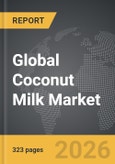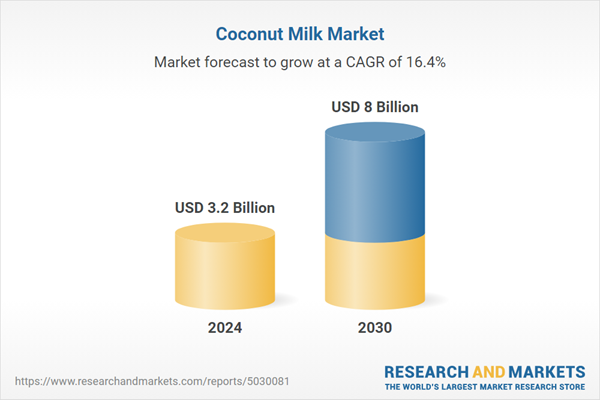Global Coconut Milk Market - Key Trends and Drivers Summarized
Why Is Coconut Milk Becoming a Staple in Modern Diets and Industries?
Coconut milk is a creamy, white liquid extracted from the grated flesh of mature coconuts. It differs from coconut water, which is the clear liquid found inside young, green coconuts. The process of producing coconut milk involves grating the white flesh of the coconut, mixing it with water, and then squeezing it to extract the rich, creamy liquid. The result is a product that contains both coconut oil and natural water, offering a balance of fat and moisture that is key to its versatility in culinary applications. Coconut milk comes in various forms, from thick, high-fat versions to lighter, more diluted varieties. The thicker version is often used in cooking to create rich sauces, soups, and curries, especially in Southeast Asian, Caribbean, and South Indian cuisines. Additionally, it can be used to create coconut cream, which has an even higher fat content and is a key ingredient in desserts and cocktails. Coconut milk's production and consumption have expanded globally, driven not only by its culinary appeal but also by its health benefits and use in plant-based diets.How Is Coconut Milk Used in Cooking and Health Products?
Coconut milk has become a versatile ingredient in both traditional and modern cooking, as well as in health and wellness products. In the culinary world, it is a key component in dishes from Southeast Asia, such as Thai curries and soups, where it adds a rich, creamy texture and a mildly sweet flavor that balances spices. Its ability to add depth and richness without dairy makes it a popular choice in vegan and lactose-free recipes. Coconut milk is also used in Caribbean cuisine for dishes like rice and peas, and it plays a central role in many South Indian curries and desserts. Beyond savory dishes, coconut milk is a popular ingredient in smoothies, shakes, and desserts like coconut rice pudding and ice cream, offering a natural creaminess without the need for dairy products. In recent years, the demand for coconut milk has surged in the health and wellness sectors, particularly as more people adopt plant-based diets and seek alternatives to traditional dairy products. Coconut milk is a preferred substitute in dairy-free milks, creams, and yogurts due to its creamy texture and nutrient content. The fats found in coconut milk are primarily medium-chain triglycerides (MCTs), which are believed to be more readily metabolized by the body and may offer some health benefits, such as increased energy and weight management support. Coconut milk is also used in skincare products, thanks to its hydrating properties, and is a popular choice for shampoos, conditioners, and lotions aimed at moisturizing and nourishing the skin and hair. The growing emphasis on natural and sustainable products has further increased its appeal across food, health, and beauty industries.What Innovations Are Impacting the Production and Uses of Coconut Milk?
The production and application of coconut milk have evolved significantly in response to increasing global demand and technological advancements. One of the key innovations in coconut milk production is the development of more efficient extraction techniques, which allow for the production of higher-quality milk with less waste. Traditional methods of manually grating and squeezing coconut flesh have given way to automated processes that not only increase yield but also preserve the nutrients and natural flavor of the coconut. These advancements have made it easier to produce coconut milk at a commercial scale, supporting its growing presence in global markets. In addition to production improvements, the packaging and preservation of coconut milk have also seen innovation. Previously, coconut milk had a relatively short shelf life due to its natural oils, which can spoil if not properly stored. However, modern packaging techniques, including aseptic cartons and cans with advanced linings, have extended the shelf life of coconut milk, making it more accessible to consumers and reducing food waste. Furthermore, coconut milk is increasingly being fortified with additional nutrients, such as calcium and vitamins, to appeal to health-conscious consumers seeking dairy alternatives with similar nutritional profiles to cow's milk. Innovations in food science have expanded the applications of coconut milk beyond traditional cooking. It is now used as a base for non-dairy cheese, yogurt, and ice cream, as well as in plant-based meat products that require a rich, fatty element. The rise of ready-to-drink coconut milk beverages has also contributed to its increased popularity, providing consumers with a convenient, portable option for enjoying the benefits of coconut milk. Additionally, with the growing consumer interest in organic and sustainably sourced ingredients, many companies are focusing on ethical sourcing and fair trade practices in coconut production.What Factors Are Driving Growth in the Coconut Milk Market?
The growth in the coconut milk market is driven by several key factors, including the rising demand for plant-based alternatives, increasing awareness of health benefits, and the global expansion of cuisines that utilize coconut milk. One of the most significant drivers is the surge in veganism, vegetarianism, and lactose intolerance awareness, which has led consumers to seek non-dairy alternatives for their diets. As people move away from traditional dairy products, coconut milk has emerged as a popular choice due to its rich texture, versatility, and favorable nutritional profile. Plant-based milk alternatives, including coconut milk, have seen widespread adoption in everything from coffee shops to commercial kitchens, further driving market growth. Another factor contributing to the increased demand for coconut milk is the growing consumer interest in global cuisines, particularly Asian, Caribbean, and African foods where coconut milk is a staple ingredient. As people become more adventurous in their cooking and dining choices, the demand for coconut milk as a core component of many exotic dishes has risen significantly. This trend is also supported by the increasing availability of coconut milk in supermarkets and online grocery platforms, making it easier for consumers to incorporate it into their daily meals. Health-conscious consumers are also drawn to coconut milk for its perceived benefits. While coconut milk is high in fat, much of it is in the form of medium-chain triglycerides (MCTs), which have been linked to various health benefits, such as improved metabolism and heart health. The trend toward functional foods, where consumers seek ingredients that provide both nourishment and specific health benefits, has further boosted the popularity of coconut milk. Additionally, the rise in demand for natural, organic, and ethically sourced products has aligned with the broader trend toward sustainability, leading to greater emphasis on environmentally friendly coconut farming and fair trade practices. All of these factors, combined with innovations in production and distribution, continue to fuel the rapid growth of the coconut milk market on a global scale.Report Scope
The report analyzes the Coconut Milk market, presented in terms of market value (USD). The analysis covers the key segments and geographic regions outlined below.- Segments: Category (Conventional Coconut Milk, Organic Coconut Milk); Packaging Type (Tetra Packs, Plastic Bottles, Cans); End-Use (Food Services, Household, Catering Services, Other End-Uses).
- Geographic Regions/Countries: World; United States; Canada; Japan; China; Europe (France; Germany; Italy; United Kingdom; Spain; Russia; and Rest of Europe); Asia-Pacific (Australia; India; South Korea; and Rest of Asia-Pacific); Latin America (Argentina; Brazil; Mexico; and Rest of Latin America); Middle East (Iran; Israel; Saudi Arabia; United Arab Emirates; and Rest of Middle East); and Africa.
Key Insights:
- Market Growth: Understand the significant growth trajectory of the Tetra Packs segment, which is expected to reach US$5 Billion by 2030 with a CAGR of 18.6%. The Plastic Bottles segment is also set to grow at 14% CAGR over the analysis period.
- Regional Analysis: Gain insights into the U.S. market, valued at $801.3 Million in 2024, and China, forecasted to grow at an impressive 21.3% CAGR to reach $2.1 Billion by 2030. Discover growth trends in other key regions, including Japan, Canada, Germany, and the Asia-Pacific.
Why You Should Buy This Report:
- Detailed Market Analysis: Access a thorough analysis of the Global Coconut Milk Market, covering all major geographic regions and market segments.
- Competitive Insights: Get an overview of the competitive landscape, including the market presence of major players across different geographies.
- Future Trends and Drivers: Understand the key trends and drivers shaping the future of the Global Coconut Milk Market.
- Actionable Insights: Benefit from actionable insights that can help you identify new revenue opportunities and make strategic business decisions.
Key Questions Answered:
- How is the Global Coconut Milk Market expected to evolve by 2030?
- What are the main drivers and restraints affecting the market?
- Which market segments will grow the most over the forecast period?
- How will market shares for different regions and segments change by 2030?
- Who are the leading players in the market, and what are their prospects?
Report Features:
- Comprehensive Market Data: Independent analysis of annual sales and market forecasts in US$ Million from 2024 to 2030.
- In-Depth Regional Analysis: Detailed insights into key markets, including the U.S., China, Japan, Canada, Europe, Asia-Pacific, Latin America, Middle East, and Africa.
- Company Profiles: Coverage of players such as Celebes Coconut Corporation, Charoen Pokphand Foods Public Company Limited, Chef's Choice Foods Manufacturer Co., Ltd., Ducoco Alimentos S.A., Fresh Fruit Ingredients Inc. and more.
- Complimentary Updates: Receive free report updates for one year to keep you informed of the latest market developments.
Some of the 41 companies featured in this Coconut Milk market report include:
- Celebes Coconut Corporation
- Charoen Pokphand Foods Public Company Limited
- Chef's Choice Foods Manufacturer Co., Ltd.
- Ducoco Alimentos S.A.
- Fresh Fruit Ingredients Inc.
- Goya Foods, Inc.
- GraceKennedy Limited (Jamaica)
- M&S Food Industries Sdn. Bhd.
- McCormick & Company, Inc.
- Pacific Foods of Oregon LLC
- Sambu Group
- Thai Agri Foods Public Company Limited
- ThaiCoconut public company(limited)
- The WhiteWave Foods Company
- Theppadungporn Coconut Co., Ltd.
This edition integrates the latest global trade and economic shifts into comprehensive market analysis. Key updates include:
- Tariff and Trade Impact: Insights into global tariff negotiations across 180+ countries, with analysis of supply chain turbulence, sourcing disruptions, and geographic realignment. Special focus on 2025 as a pivotal year for trade tensions, including updated perspectives on the Trump-era tariffs.
- Adjusted Forecasts and Analytics: Revised global and regional market forecasts through 2030, incorporating tariff effects, economic uncertainty, and structural changes in globalization. Includes historical analysis from 2015 to 2023.
- Strategic Market Dynamics: Evaluation of revised market prospects, regional outlooks, and key economic indicators such as population and urbanization trends.
- Innovation & Technology Trends: Latest developments in product and process innovation, emerging technologies, and key industry drivers shaping the competitive landscape.
- Competitive Intelligence: Updated global market share estimates for 2025, competitive positioning of major players (Strong/Active/Niche/Trivial), and refined focus on leading global brands and core players.
- Expert Insight & Commentary: Strategic analysis from economists, trade experts, and domain specialists to contextualize market shifts and identify emerging opportunities.
Table of Contents
Companies Mentioned (Partial List)
A selection of companies mentioned in this report includes, but is not limited to:
- Celebes Coconut Corporation
- Charoen Pokphand Foods Public Company Limited
- Chef's Choice Foods Manufacturer Co., Ltd.
- Ducoco Alimentos S.A.
- Fresh Fruit Ingredients Inc.
- Goya Foods, Inc.
- GraceKennedy Limited (Jamaica)
- M&S Food Industries Sdn. Bhd.
- McCormick & Company, Inc.
- Pacific Foods of Oregon LLC
- Sambu Group
- Thai Agri Foods Public Company Limited
- ThaiCoconut public company(limited)
- The WhiteWave Foods Company
- Theppadungporn Coconut Co., Ltd.
Table Information
| Report Attribute | Details |
|---|---|
| No. of Pages | 323 |
| Published | February 2026 |
| Forecast Period | 2024 - 2030 |
| Estimated Market Value ( USD | $ 3.2 Billion |
| Forecasted Market Value ( USD | $ 8 Billion |
| Compound Annual Growth Rate | 16.4% |
| Regions Covered | Global |









